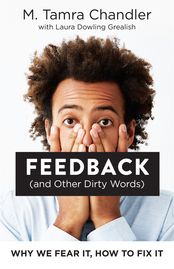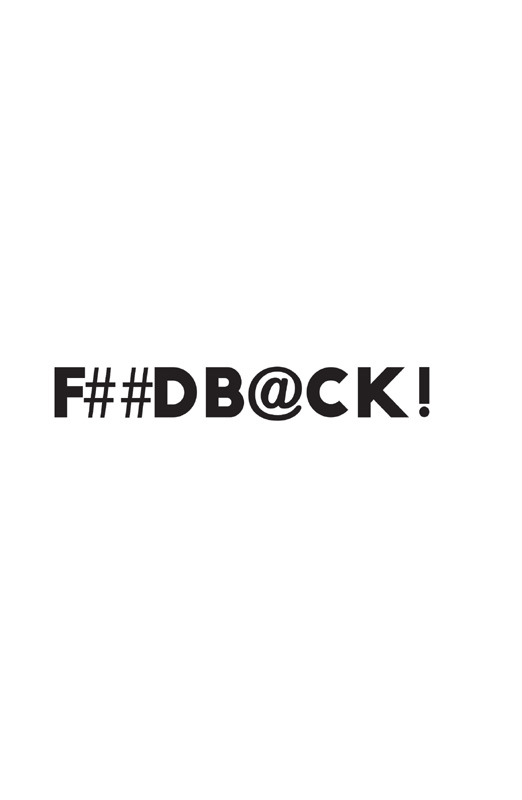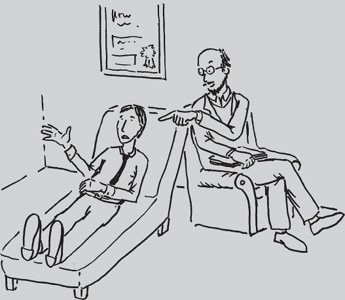Feedback (and Other Dirty Words)
Why We Fear It, How to Fix It
M. Tamra Chandler (Author) | Laura Dowling Grealish (Author)
Publication date: 06/18/2019
A practical and irreverent guide to taking the sting out of feedback and reclaiming it as a motivating, empowering experience for everyone involved.
Feedback: the mere mention of the word can make our blood pressure rise and our defenses go up. For many of us, it's a dirty word that we associate with bias, politics, resentment, and self-doubt. However, if we take a step back and think about its true intent, we realize that feedback needn't be a bad thing. After all, understanding how others experience us provides valuable opportunities to learn and grow.
Authors M. Tamra Chandler and Laura Grealish explain how feedback got such a bad rap and how to recognize and minimize the negative physical and emotional responses that can erode trust and shut down communication. They offer a new and more ambitious definition of feedback, explore the roles we each play as Seeker, Extender, and Receiver, and introduce the three Fs of making feedback focused, fair, and frequent. You'll also find valuable exercises and strategies, along with real-world examples that illustrate how you can put these ideas into action and join in the movement to fix feedback, once and for all.
When it's done right, feedback has been proven to be the most effective means of improving communication and performance for you and your organization. It's too important to give up, and with Chandler and Grealish's help, you'll be able to use it deftly, equitably, and effectively.
Feedback: the mere mention of the word can make our blood pressure rise and our defenses go up. For many of us, it's a dirty word that we associate with bias, politics, resentment, and self-doubt. However, if we take a step back and think about its true intent, we realize that feedback needn't be a bad thing. After all, understanding how others experience us provides valuable opportunities to learn and grow.
Authors M. Tamra Chandler and Laura Grealish explain how feedback got such a bad rap and how to recognize and minimize the negative physical and emotional responses that can erode trust and shut down communication. They offer a new and more ambitious definition of feedback, explore the roles we each play as Seeker, Extender, and Receiver, and introduce the three Fs of making feedback focused, fair, and frequent. You'll also find valuable exercises and strategies, along with real-world examples that illustrate how you can put these ideas into action and join in the movement to fix feedback, once and for all.
When it's done right, feedback has been proven to be the most effective means of improving communication and performance for you and your organization. It's too important to give up, and with Chandler and Grealish's help, you'll be able to use it deftly, equitably, and effectively.
Formats
Paperback - $21.95 - Members: $19.76
Paperback - $21.95 - Members: $19.76
PDF eBook - $21.95 - Members: $15.37
ePub - $21.95 - Members: $15.37
Find out more about our Bulk Buyer Program
- 10-49: 20% discount
- 50-99: 35% discount
- 100-999: 38% discount
- 1000-1999: 40% discount
- 2000+ Contact ( bookorders@bkpub.com )
Orders of 10+ copies shipping to one address receive free ground shipping
within the U.S. Shipping to separate individual addresses via USPS media mail will be applied a handling fee:
Book Details
Overview
A practical and irreverent guide to taking the sting out of feedback and reclaiming it as a motivating, empowering experience for everyone involved.
Feedback: the mere mention of the word can make our blood pressure rise and our defenses go up. For many of us, it's a dirty word that we associate with bias, politics, resentment, and self-doubt. However, if we take a step back and think about its true intent, we realize that feedback needn't be a bad thing. After all, understanding how others experience us provides valuable opportunities to learn and grow.
Authors M. Tamra Chandler and Laura Grealish explain how feedback got such a bad rap and how to recognize and minimize the negative physical and emotional responses that can erode trust and shut down communication. They offer a new and more ambitious definition of feedback, explore the roles we each play as Seeker, Extender, and Receiver, and introduce the three Fs of making feedback focused, fair, and frequent. You'll also find valuable exercises and strategies, along with real-world examples that illustrate how you can put these ideas into action and join in the movement to fix feedback, once and for all.
When it's done right, feedback has been proven to be the most effective means of improving communication and performance for you and your organization. It's too important to give up, and with Chandler and Grealish's help, you'll be able to use it deftly, equitably, and effectively.
Feedback: the mere mention of the word can make our blood pressure rise and our defenses go up. For many of us, it's a dirty word that we associate with bias, politics, resentment, and self-doubt. However, if we take a step back and think about its true intent, we realize that feedback needn't be a bad thing. After all, understanding how others experience us provides valuable opportunities to learn and grow.
Authors M. Tamra Chandler and Laura Grealish explain how feedback got such a bad rap and how to recognize and minimize the negative physical and emotional responses that can erode trust and shut down communication. They offer a new and more ambitious definition of feedback, explore the roles we each play as Seeker, Extender, and Receiver, and introduce the three Fs of making feedback focused, fair, and frequent. You'll also find valuable exercises and strategies, along with real-world examples that illustrate how you can put these ideas into action and join in the movement to fix feedback, once and for all.
When it's done right, feedback has been proven to be the most effective means of improving communication and performance for you and your organization. It's too important to give up, and with Chandler and Grealish's help, you'll be able to use it deftly, equitably, and effectively.
About the Authors
Endorsements
Excerpt











